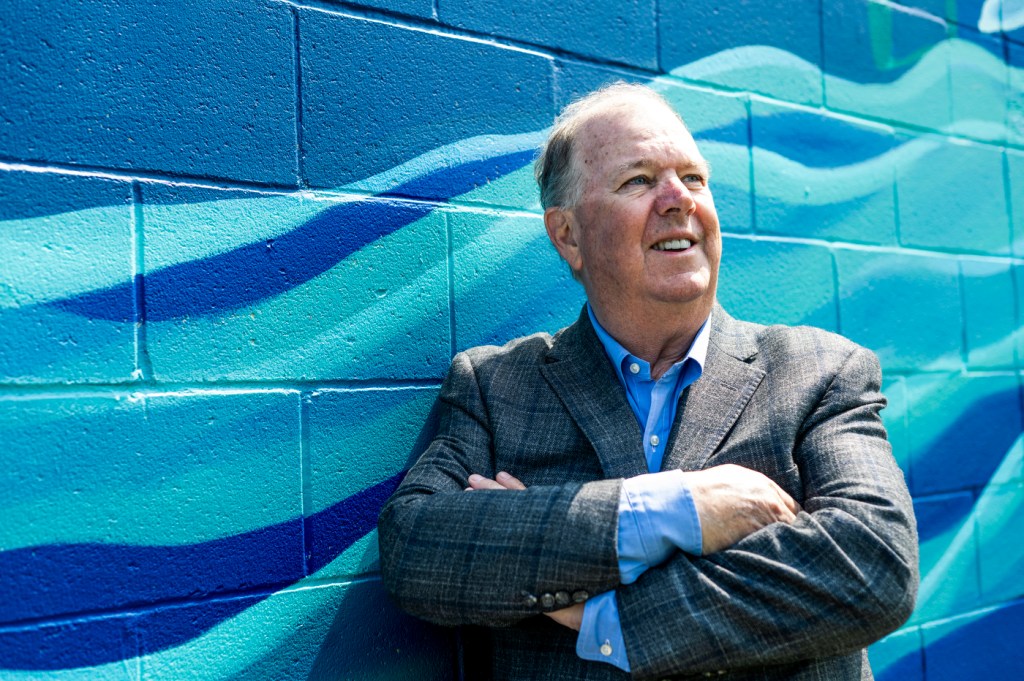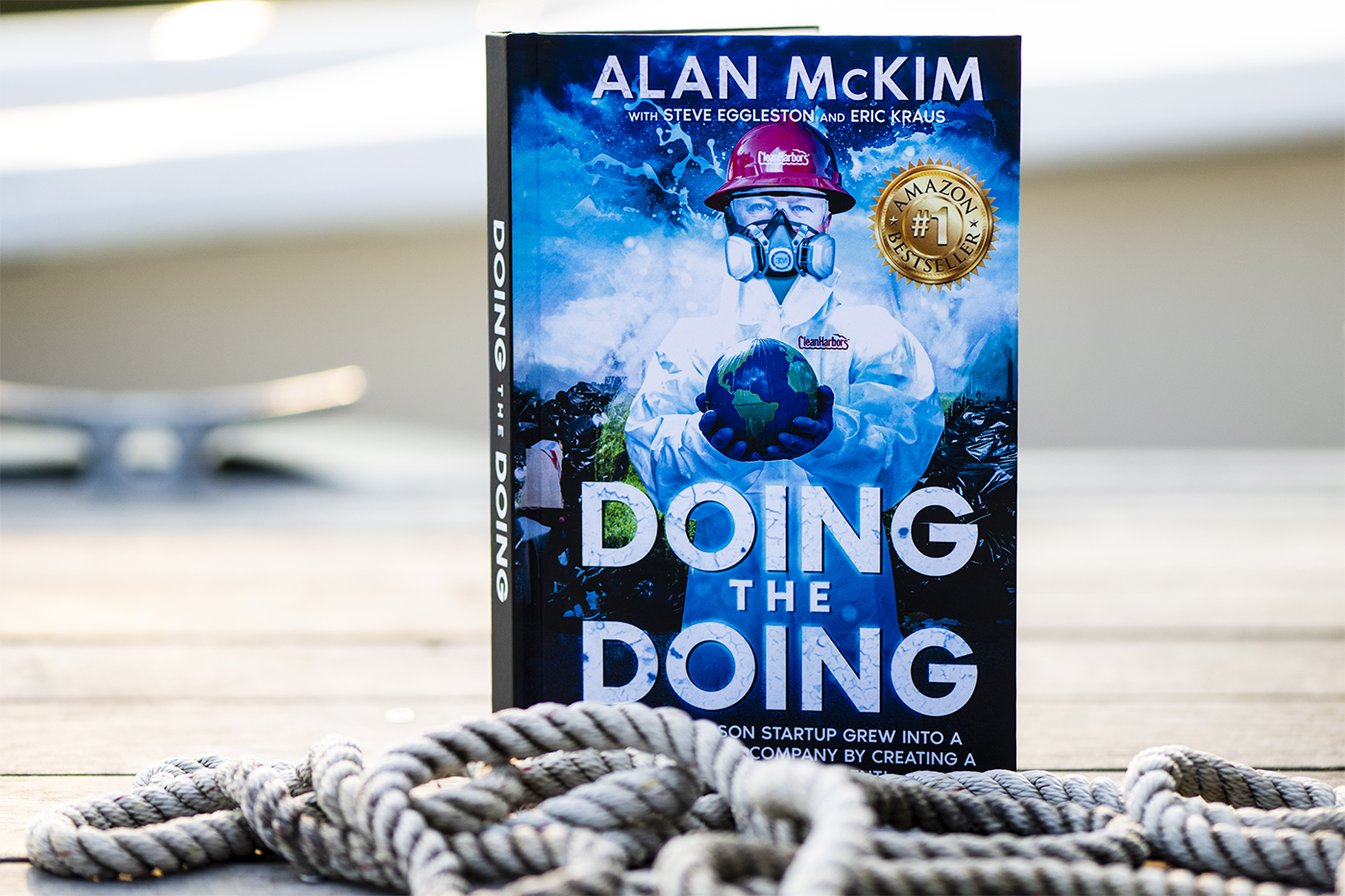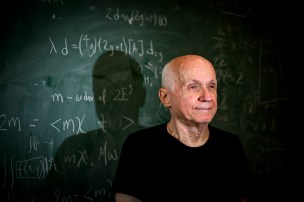Published on
Alan McKim founded Clean Harbors. As technology chief, he’ll guide it into the future
The entrepreneurial, blue-collar guy from the South Shore of Massachusetts turned one truck and four employees into a global, multi-billion-dollar environmental cleanup company.

“Tech” and “waste cleanup” don’t seem to go together. Yet for Alan McKim—vice chair of Northeastern University’s Board of Trustees; half the namesake of the D’Amore-McKim School of Business; and the founder, chairman and former CEO of the environmental cleanup giant Clean Harbors—combining the two is always top of mind.
So much so, in fact, that it’s the opener for his autobiography, “Doing the Doing.” In the book’s preface, McKim recounts waking up to a text message informing him that Clean Harbors had fallen victim to a ransomware attack. It was August 2020. The attackers, who turned out to be a Ukraine-based dark-web outfit called the MAZE cartel, were holding Clean Harbors hostage. They threatened to disable its computer infrastructure unless the company paid a $68 million ransom.
A lot was at stake. Clean Harbors is the largest emergency-management response company in North America, with a vast network connecting its worldwide operations. A wealth of proprietary data helps the company respond quickly to emergencies all around the world. “We have more than 900 servers strategically situated in multiple locations throughout the United States and Canada,” McKim, 68, writes in the book.
His team decided to disable everything—“all 450 of our offices and plants located across North America are down, as well as those in India,” he writes. To avoid panicking employees, they told each office merely that they are experiencing “an internet outage.” Working quickly, with the help of the FBI and outside cybersecurity firms, the Clean Harbors team rebuilt every server and system and locked out the attackers, who eventually moved on.
Clean Harbors was instrumental in recovering New York’s World Trade Center site after 9/11, cleaning up the 2010 Deepwater Horizon oil spill, and medically decontaminating tens of thousands of sites during the height of the COVID-19 pandemic. Taking decisive action is in the company’s DNA, which made it primed and ready to respond to its own internal emergency; working methodically yet quickly, Clean Harbors got to the other side of it by the end of that Labor Day weekend.
For McKim, the incident was emblematic of a new battlefield in “disaster” recovery—and a new chapter in his own, storied professional journey. After four decades as CEO of the company he built from nothing, McKim transitioned into a new role this spring as the company’s chief technology officer.

It speaks to tech innovation’s importance to Clean Harbors’ continued growth and success. But friends and colleagues say it’s a logical fit for McKim, who loves to tinker with everything from old car parts to navigational software on his fishing boat. Plus, despite his long-standing role at the top of the Clean Harbors org chart, he’s happiest at work when he’s both literally and figuratively down in the muck—getting his hands dirty, sweating small details, and fixing problems of any size.
“I still wanted to have my fingers in strategy,” he says during an interview at Clean Harbors’ headquarters in Norwell, Massachusetts. “Technology is changing so quickly, whether you’re using the cloud or integrating AI. So I see myself driving the tools and technologies to support the business and what our customers need.”
McKim’s transition to CTO this spring came alongside the appointment of two longtime Clean Harbors executives as co-CEOs: Chief Operations Officer Eric Gerstenberg and Chief Financial Officer Mike Battles. “Succession” jokes aside, both the step-down to CTO and the co-CEO appointments are increasingly popular in the corporate world. Oracle founder Larry Ellison appointed co-CEOs as his replacements when he stepped down from that company’s top job in 2014, to become CTO. Netflix has co-CEOs, and Elon Musk became Twitter’s CTO when new CEO Linda Yaccarino took over in June.
Battles says that for McKim, it’s a way to devote more time to the inner workings and future of the company on an intimate level. “He’s certainly much more focused on technology than the average CEO,” Battles says.
Partially, that’s due to the nature of Clean Harbors’ business. The $5 billion company’s calling card is hazardous waste, which, unlike everyday trash, has to be carefully profiled and tracked at every step of its disposal.
“We have invested heavily in software development because of the unique nature of the work that we do,” McKim says. When he earned his MBA from Northeastern University in 1988, it was a watershed moment in his professional life—“Doing the Doing” is dedicated to his mentor and longtime Northeastern University business school professor Dan McCarthy. It also opened his eyes to how technology could help his still-growing company. “I remember learning about VisiCalc and using some of the other early Excel-type technologies,” he says. “Microsoft hadn’t even been invented yet; things were just starting to develop.”
When Clean Harbors began expanding in earnest in the 1980s and 1990s, “There wasn’t any off-the-shelf stuff that we could buy, that would do waste tracking or response work. So we began building out our own platform,” McKim says. That platform, the Waste Information Network (WIN), has remained the cornerstone of Clean Harbors for decades.
Hazardous waste itself changes with technological development. Lithium-ion batteries, now common in everything from electric cars to smartphones, have become a formidable—and perilous—disposal issue in recent years. “People don’t appreciate how dangerous lithium is,” McKim says. “It reacts with water, and even a moisture change in the environment can make it self-ignite if it’s not packed properly. We’ve had two trailers catch on fire because they were storing lithium.” Another huge waste segment he sees on the horizon is solar panels, the first wave of which are starting to break down and become obsolete.
McKim has been proactive in pushing the company’s operations into the future as well. Over the past decade, Clean Harbors has started incorporating cloud-based functions into its systems, mainly to enable certain AI capabilities. “We were using automation and artificial intelligence to manage our billing systems before it became cool to talk about it. That’s Alan,” Battles says.
For McKim, stepping down as CEO isn’t so much about relinquishing control of his company, but rather a way to devote more time to its inner workings; what really makes it tick. “He gets into the details,” says George Curtis, an executive vice president at Clean Harbors and longtime friend. “He’s learned to delegate more, but with me, other senior managers here, he still wants in.”
McKim started Clean Harbors in 1980 after spending his first few working years at a small oil clean-up company, Jet-Line. He built his first vacuum truck himself and hired three colleagues away from his former employer. (Later on, Jet-Line would become a Clean Harbors acquisition.) Clean Harbors’ first job was cleaning out a Texaco fuel oil tanker for $600.
Technology is changing so quickly, whether you’re using the cloud or integrating AI. So I see myself driving the tools and technologies to support the business and what our customers need.
Alan McKim, vice chair of Northeastern’s Board of Trustees; half the namesake of the D’Amore-McKim School of Business, and former CEO of the environmental cleanup giant Clean Harbors
Northeastern President Joseph E. Aoun describes McKim a visionary entrepreneur who embodies the perfect combination of foresight, grit and innovative spirit.
“He has built a global enterprise around environmental sustainability that is powered through the seamless integration of people and technology,” Aoun says. “His passion for Northeastern is inspiring and we are honored to have him as a trustee and generous benefactor.”
In “Doing the Doing,” released in Februrary, McKim documents feeling pulled, in the company’s early years, between the actual work of Clean Harbors—waking up at all hours, rushing off to disaster sites—and the top-level demands of running a corporation growing at a breakneck pace.
“When I looked in the mirror, I still saw an accidental businessman,” he writes. “I had one big foot in the day-to-day operations of transportation, cleaning oil tanks and going out to cleanups, and another, smaller foot in the business of growing a company. … I loved getting my hands dirty and the adrenaline rush of answering the bell to a big cleanup job, but I also came to love the world of sales, business development and deals.”
That became all-consuming in short order. Over the years, Clean Harbors’ eye-popping growth came in large part through acquisitions, as it expanded its services into household waste, health-care disposal, and more. One truck became 5,000; Clean Harbors is the 19th-largest transportation company in North America. By 1987, the company was pulling in $50 million in revenue and was listed on the New York Stock Exchange for $9 a share. Currently, shares are worth about $150 each.
McKim makes a habit of immersing himself in the nitty gritty of whatever he takes on. In 2020, he appeared on the CBS show “Undercover Boss,” posing as an entry-level laborer for Clean Harbors at sites in Boston, Indiana and Texas, and cleaning out oil tanks and cement mixers. Much is made, on the episode, of McKim’s claustrophobia as he’s lowered into the dark, dirty tanks. But there’s never the sense that such jobs are totally new to him. In his non-work life, he’s an avid deep-sea tuna fisherman and sits on the board of South Shore Hospital, to which he and his family donated $5 million in 2012, as well as Northeastern University’s Board of Trustees.
“He’s not just donating the money,” says Curtis, who graduated from Northeastern in 1988. “He’s getting engaged; he’s not just the ‘blank check and throw me a party and shake my hand’ kind of guy. That truly makes him different from other philanthropists.”
Curtis and McKim have been fishing buddies for more than 35 years. In 1992, they entered a shark-fishing tournament together, and, through sheer luck, caught a 350-pound tuna and became hooked on the sport. Curtis says that McKim’s penchant for how things work extends to that hobby as well.
“Alan is much better mechanically than I am,” he laughs. “He’s the much better operator for driving the boat and understanding the engines and all the pieces and parts. He’s definitely a gearhead at heart. I get the crew together, do the bait, I get the lunch and I get the drinks. The first mate, so to speak.”
In addition to devoting more time to tuna fishing, McKim says he hopes the CTO transition will give him more time to spend with his 11 grandchildren, who all live near his home in Norwell, and to travel—he’d love to go to Tokyo to visit the famed Tosuyu fish market and tuna auction, where a few of his fish have been sold. But it’s far from a “retirement”—he remains as plugged into the company he built from nothing as ever.
“He says he’s going to cut down to 40 hours a week,” Curtis chuckles. “I’m interested to see if that’s accurate.”
Schuyler Velasco is a Northeastern Global News Magazine reporter. Email her at s.velasco@northeastern.edu. Follow her on Twitter @Schuyler_V





